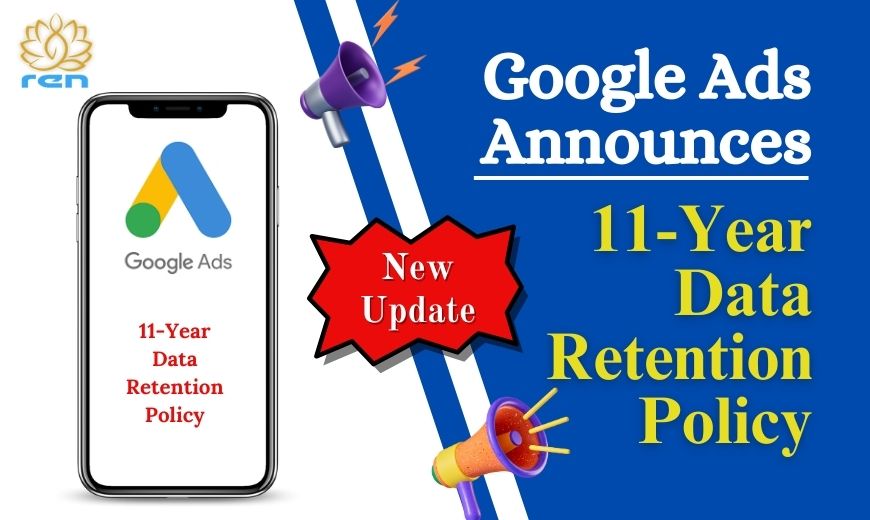
Google Ads has announced a significant update to its data retention policy, which will take effect on November 13. This new policy limits access to historical data, imposing a restriction that only allows advertisers to access data from the last 11 years. This move highlights a growing trend toward more structured data management and privacy compliance in the tech industry. But what does this mean for your advertising strategy, and how should you prepare? In this blog, we’ll explore how the Google Ads data retention policy could affect your campaigns, the role of restricted data processing, and how you can adapt your strategies to stay ahead.
What You Need to Know About the New Google Ads Data Retention Policy
The Google Ads data retention policy update brings about some significant changes. Here’s a breakdown of what you can expect:
- Scope of the Policy: The new policy applies to data accessed through Google Ads API, specifically through GoogleAds.Search and GoogleAds.SearchStream. If you use these tools to retrieve data, you’ll be impacted by the new limits.
- The 11-Year Limitation: The most notable change is the new data retention limit. As of November 13, Google Ads will no longer allow advertisers to access data older than 11 years from the date of an API request.
- Impact on Historical Data: This change affects all types of data, including performance metrics, billing information, and historical reports. For advertisers and agencies that depend on long-term data for trend analysis or forecasting, this could be a game-changer.
Why Google Ads is Making This Change
The shift in data retention aligns with broader trends in the tech industry towards more defined and transparent data lifecycles. As data privacy concerns grow, companies like Google are making efforts to be more transparent about how long they store data and how that data is used.
The Google Ads data retention policy also addresses evolving global privacy regulations, such as the GDPR (General Data Protection Regulation) and the CCPA (California Consumer Privacy Act). These regulations place stricter controls on the amount of personal data companies can store and process, pushing tech companies to limit data retention periods to ensure compliance.
What Advertisers Need to Do
If you rely on data older than 11 years, there are a few steps you need to take before November 13 to ensure you don’t lose access to important historical information:
- Retrieve and Store Data: Google recommends that advertisers retrieve and securely store any data older than 11 years before the policy takes effect. This could include exporting reports or saving specific performance data that may be valuable for future analysis.
- Assess Your Data Needs: For many advertisers, having access to long-term data isn’t a day-to-day necessity. However, for those who depend on historical trend analysis or detailed performance forecasting, this could impact your future strategies. It’s essential to evaluate whether you need to act before the deadline to secure data.
- Adapt Your Reporting Strategy: With access to only 11 years of historical data, advertisers may need to adjust how they measure long-term trends and performance. It may require adjusting campaign strategies or relying more on real-time data for decision-making.
How Google Ads Restricted Data Processing Affects This Policy
While the 11-year data retention policy is a significant update, it also intersects with Google Ads restricted data processing, a policy that limits the use of personal data in certain regions due to privacy regulations.
Restricted data processing means that Google Ads will restrict how personal data is used, especially in regions where stricter privacy laws are enforced. This could impact the granularity of the data available to advertisers. For instance, in the European Union, where GDPR regulations apply, data about individual users may be anonymized or excluded entirely from certain reports, limiting advertisers’ ability to target or analyze specific audiences.
Implications for Advertising Strategy
So, what does this mean for your advertising strategy? The new data retention policy and restricted data processing could influence several aspects of how you run your campaigns.
Trend Analysis and Forecasting
One of the primary effects of the Google Ads data retention policy will be on trend analysis. With only 11 years of historical data available, advertisers may face challenges in analyzing long-term trends, especially if they need data beyond that time frame.
How to Adapt: If you heavily rely on historical trends for your advertising strategies, consider building your own data warehouse or using other tools to archive critical reports. This can help ensure you have access to the data you need even after Google enforces the 11-year limitation.
Performance Metrics and Reporting
With the new data retention limit, performance metrics and historical reports will be capped at 11 years. For some advertisers, especially those running long-term campaigns, this could restrict access to older campaign data that may have provided valuable insights.
How to Adapt: You may need to adjust how you analyze your campaigns. Rather than relying on old data, focus on optimizing your current campaigns and collecting data going forward. Consider using more advanced reporting tools to capture detailed metrics before they are restricted.
Privacy and Compliance Considerations
As Google Ads restricted data processing limits the use of personal data in specific regions, you must ensure that your advertising practices comply with privacy regulations. This will likely lead to more anonymized data and could impact ad targeting and audience segmentation.
How to Adapt: Ensure that you are transparent about your data usage and compliant with privacy regulations like GDPR and CCPA. You may also want to focus more on aggregated data and contextual targeting to maintain campaign performance while respecting privacy.
Data Security and Archiving
The new policy highlights the importance of securing and managing your data. As data retention limits become more structured, the risk of losing valuable historical data increases.
How to Adapt: Invest in robust data security measures and backup solutions to ensure that you can retain crucial data for future use. Consider utilizing cloud storage or data management platforms to keep your data safe and easily accessible when needed.
Conclusion
Google’s 11-year data retention policy is a significant milestone in the evolution of digital advertising, bringing both opportunities and challenges for advertisers. While it offers benefits such as clearer data lifecycles and enhanced compliance with privacy regulations, it also creates hurdles for those who rely on long-term trend analysis and forecasting. Advertisers must act swiftly to secure any crucial historical data before the policy goes into effect on November 13.
At REN Digital Solutions, we understand the evolving landscape of digital marketing and can help you navigate these changes smoothly. Whether you are looking for the Best Digital Marketing Company in Crossing Republik or the Best SEO Company in Crossing Republik, we have the expertise to enhance your online presence and keep your business on the cutting edge of digital advertising. Contact us today at +91-8851070527 or +91-7217871051 to discuss how we can help you adjust your strategy in response to the new Google Ads data retention policy and other industry shifts.



